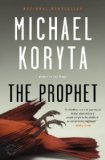Summary | Excerpt | Reading Guide | Reviews | Beyond the Book | Read-Alikes | Genres & Themes | Author Bio

This article relates to The Prophet
In The Prophet Adam Austen is a licensed commercial bail bondsman. It is a profession unique to only two countries in the world, the United States and the Philippines (a former U.S. colony).
 Other countries use a variety of methods to ensure that defendants will show up for a court date. For example, in the UK, in the case of serious crimes such as murder, defendants will likely be kept in jail; but in most other cases defendants are released back into the community "on bail" with or without restrictions (such as limits on where they can travel) and with the knowledge that failure to attend court will add an additional crime to their record. In some cases, defendants (or people standing surety for them) are required to pay a penalty if they don't show up for their court date, but the difference between this and the U.S. is that very rarely is this surety paid up front, and it is never paid by a commercial bail bondsman.
Other countries use a variety of methods to ensure that defendants will show up for a court date. For example, in the UK, in the case of serious crimes such as murder, defendants will likely be kept in jail; but in most other cases defendants are released back into the community "on bail" with or without restrictions (such as limits on where they can travel) and with the knowledge that failure to attend court will add an additional crime to their record. In some cases, defendants (or people standing surety for them) are required to pay a penalty if they don't show up for their court date, but the difference between this and the U.S. is that very rarely is this surety paid up front, and it is never paid by a commercial bail bondsman.
In the United States, however, a judge may set what is called bail bond, that is, the suspect must present something of monetary value - say, cash or real property - in order to assure an appearance at trial. In all but four states (Illinois, Kentucky, Oregon, and Wisconsin) this sum is often insured by a commercial bail bondsman. In those instances bail is set by a judge and the bail bondsman collects ten percent from the defendant as a nonrefundable guarantee that he will keep his court date. If the defendant fails to appear, the onus of tracking and apprehending him (or her, of course) is the bail bondsman's responsibility. Should he fail to apprehend the defendant, the bail bondsman must ante up the full amount of the bail to the court.
In any case, appear or not, guilty or innocent, the bail bondsman keeps that ten percent upfront money. It is a system that is frequently criticized because of the cost-burden it places on defendants who may eventually be proven innocent of the crime with which they were charged. The National Association of Pretrial Services Agencies (NAPSA), the American Bar Association (ABA), and the National District Attorneys Association (NDAA) are among those who criticize the industry. Proponents of the commercial bail bondsman industry, however, assert that they provide a valuable service at no cost to taxpayers. They say it is an important public/private partnership that offers a "safer and more responsible method of releasing defendants prior to trial." According to a 2010 paper published by the New York City Criminal Justice Agency, "Nationally, the commercial bail bond industry has seen enormous growth since the early 1990s, according to data from the Bureau of Justice Statistics." Between the National Conference of State Legislatures, Professional Bail Agents of the United States and the American Bail Coalition (dedicated to the growth and continuation of the surety bail bond industry) and others, the argument in favor of the commercial bail bond system is intense.
Pro or con it is an industry that contributes to the dimension and complexity of the American jurisprudence system in addition to nourishing the demand for that legendary American antihero, the bounty hunter. But that's a whole other story in itself.
Filed under Society and Politics
![]() This "beyond the book article" relates to The Prophet. It originally ran in September 2012 and has been updated for the
August 2013 paperback edition.
Go to magazine.
This "beyond the book article" relates to The Prophet. It originally ran in September 2012 and has been updated for the
August 2013 paperback edition.
Go to magazine.
We have to abandon the idea that schooling is something restricted to youth...
Click Here to find out who said this, as well as discovering other famous literary quotes!
Your guide toexceptional books
BookBrowse seeks out and recommends the best in contemporary fiction and nonfiction—books that not only engage and entertain but also deepen our understanding of ourselves and the world around us.